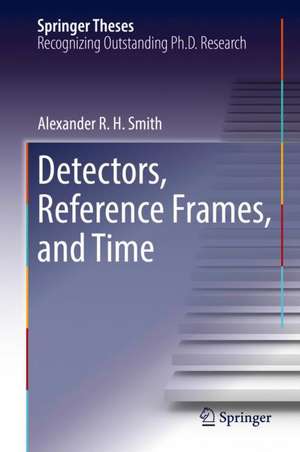Detectors, Reference Frames, and Time: Springer Theses
Autor Alexander R. H. Smithen Limba Engleză Hardback – 16 iul 2019
Din seria Springer Theses
- 18%
 Preț: 997.88 lei
Preț: 997.88 lei -
 Preț: 389.88 lei
Preț: 389.88 lei - 15%
 Preț: 646.94 lei
Preț: 646.94 lei - 18%
 Preț: 943.43 lei
Preț: 943.43 lei -
 Preț: 399.29 lei
Preț: 399.29 lei - 18%
 Preț: 944.99 lei
Preț: 944.99 lei - 15%
 Preț: 636.80 lei
Preț: 636.80 lei - 18%
 Preț: 941.05 lei
Preț: 941.05 lei - 15%
 Preț: 643.16 lei
Preț: 643.16 lei - 15%
 Preț: 642.68 lei
Preț: 642.68 lei - 18%
 Preț: 1103.62 lei
Preț: 1103.62 lei - 20%
 Preț: 558.82 lei
Preț: 558.82 lei - 18%
 Preț: 1112.30 lei
Preț: 1112.30 lei - 18%
 Preț: 944.19 lei
Preț: 944.19 lei - 18%
 Preț: 1109.92 lei
Preț: 1109.92 lei - 18%
 Preț: 1217.27 lei
Preț: 1217.27 lei - 15%
 Preț: 640.06 lei
Preț: 640.06 lei - 15%
 Preț: 636.45 lei
Preț: 636.45 lei - 15%
 Preț: 640.06 lei
Preț: 640.06 lei - 15%
 Preț: 640.88 lei
Preț: 640.88 lei -
 Preț: 389.70 lei
Preț: 389.70 lei - 20%
 Preț: 563.89 lei
Preț: 563.89 lei -
 Preț: 393.35 lei
Preț: 393.35 lei - 15%
 Preț: 637.93 lei
Preț: 637.93 lei - 15%
 Preț: 641.85 lei
Preț: 641.85 lei - 18%
 Preț: 1225.94 lei
Preț: 1225.94 lei - 20%
 Preț: 551.36 lei
Preț: 551.36 lei - 18%
 Preț: 1229.10 lei
Preț: 1229.10 lei - 15%
 Preț: 639.25 lei
Preț: 639.25 lei - 18%
 Preț: 999.45 lei
Preț: 999.45 lei - 15%
 Preț: 640.06 lei
Preț: 640.06 lei - 18%
 Preț: 1220.45 lei
Preț: 1220.45 lei - 18%
 Preț: 1116.26 lei
Preț: 1116.26 lei - 18%
 Preț: 1110.72 lei
Preț: 1110.72 lei - 18%
 Preț: 1000.87 lei
Preț: 1000.87 lei - 18%
 Preț: 891.17 lei
Preț: 891.17 lei - 15%
 Preț: 640.06 lei
Preț: 640.06 lei - 5%
 Preț: 1154.07 lei
Preț: 1154.07 lei - 15%
 Preț: 635.96 lei
Preț: 635.96 lei - 15%
 Preț: 640.88 lei
Preț: 640.88 lei -
 Preț: 387.20 lei
Preț: 387.20 lei - 18%
 Preț: 1109.92 lei
Preț: 1109.92 lei -
 Preț: 385.25 lei
Preț: 385.25 lei -
 Preț: 385.25 lei
Preț: 385.25 lei - 18%
 Preț: 1112.30 lei
Preț: 1112.30 lei - 18%
 Preț: 999.45 lei
Preț: 999.45 lei -
 Preț: 386.99 lei
Preț: 386.99 lei - 15%
 Preț: 637.13 lei
Preț: 637.13 lei - 20%
 Preț: 554.20 lei
Preț: 554.20 lei - 20%
 Preț: 555.57 lei
Preț: 555.57 lei
Preț: 641.20 lei
Preț vechi: 754.36 lei
-15% Nou
Puncte Express: 962
Preț estimativ în valută:
122.69€ • 128.45$ • 101.52£
122.69€ • 128.45$ • 101.52£
Carte tipărită la comandă
Livrare economică 08-22 aprilie
Preluare comenzi: 021 569.72.76
Specificații
ISBN-13: 9783030109998
ISBN-10: 3030109992
Pagini: 206
Ilustrații: XIX, 167 p. 25 illus., 23 illus. in color.
Dimensiuni: 155 x 235 mm
Greutate: 0.44 kg
Ediția:1st ed. 2019
Editura: Springer International Publishing
Colecția Springer
Seria Springer Theses
Locul publicării:Cham, Switzerland
ISBN-10: 3030109992
Pagini: 206
Ilustrații: XIX, 167 p. 25 illus., 23 illus. in color.
Dimensiuni: 155 x 235 mm
Greutate: 0.44 kg
Ediția:1st ed. 2019
Editura: Springer International Publishing
Colecția Springer
Seria Springer Theses
Locul publicării:Cham, Switzerland
Cuprins
Chapter1. Introduction.- Part1: Detectors in Curved Spacetimes.- Chapter2. Quantum Field Theory on Curved Spacetimes.- Chapter3. The Unruh-DeWitt Detector and Entanglement Harvesting.- Chapter4. Unruh-DeWitt Detectors in Quotients of Minkowski Space.- Chapter5. Unruh-DeWitt Detectors in (2+1)-dimensional Black Hole Spacetimes.- Part2: Quantum Reference Frames.- Chapter6. Quantum reference frames associated with noncompact groups.- Chapter7. Communication without a shared reference frame.- Part3: Quantizing Time.- Chapter8. The conditional probability interpretation of time.
Notă biografică
Alexander Smith received his PhD from the University of Waterloo in 2017. He holds an NSERC Postdoctoral Fellowship, and a Junior Fellowship in the Society of Fellows, both at Dartmouth College.
Textul de pe ultima copertă
This thesis uses the tools of quantum information science to uncover fascinating new insights about the intersection of quantum theory and relativity. It is divided into three self-contained parts, the first of which employs detector models to investigate how the information content of quantum fields depends on spacetime curvature and global spacetime topology. The behavior of Unruh-DeWitt detectors on curved spacetimes are investigated, following which these detectors are used to probe the vacuum state of a scalar field in various topologies. This leads to a generalization of the entanglement harvesting protocol involving detectors in arbitrary curved spacetimes admitting a Wightman function. The second part extends the theory of quantum reference frames to those associated with noncompact groups. Motivated by the pursuit of a relational relativistic quantum theory where the group of reference frames is the Poincaré group, the author then generalizes a communication protocol between two parties lacking a common reference frame to the scenario where the group of transformations of their reference frame is a one-dimensional noncompact Lie group. Finally, the third part, inspired by theories of quantum gravity, generalizes the conditional probability interpretation of time, a proposed mechanism for time to emerge from a fundamentally timeless Universe. While the conditional probability interpretation of time is based upon conditioning a solution to the Wheeler-DeWitt equation on a subsystem of the universe that acts a clock, the author extends this approach to include an interaction between the system being used as a clock and a system whose evolution the clock is tracking.
Caracteristici
Nominated as an outstanding PhD thesis by the University of Waterloo Applies quantum information science to discover new insights connecting quantum theory and relativity Uses detector models to uncover the effects of spacetime topology on the information content of quantum fields Generalizes a proposed mechanism for the quantum emergence of time
